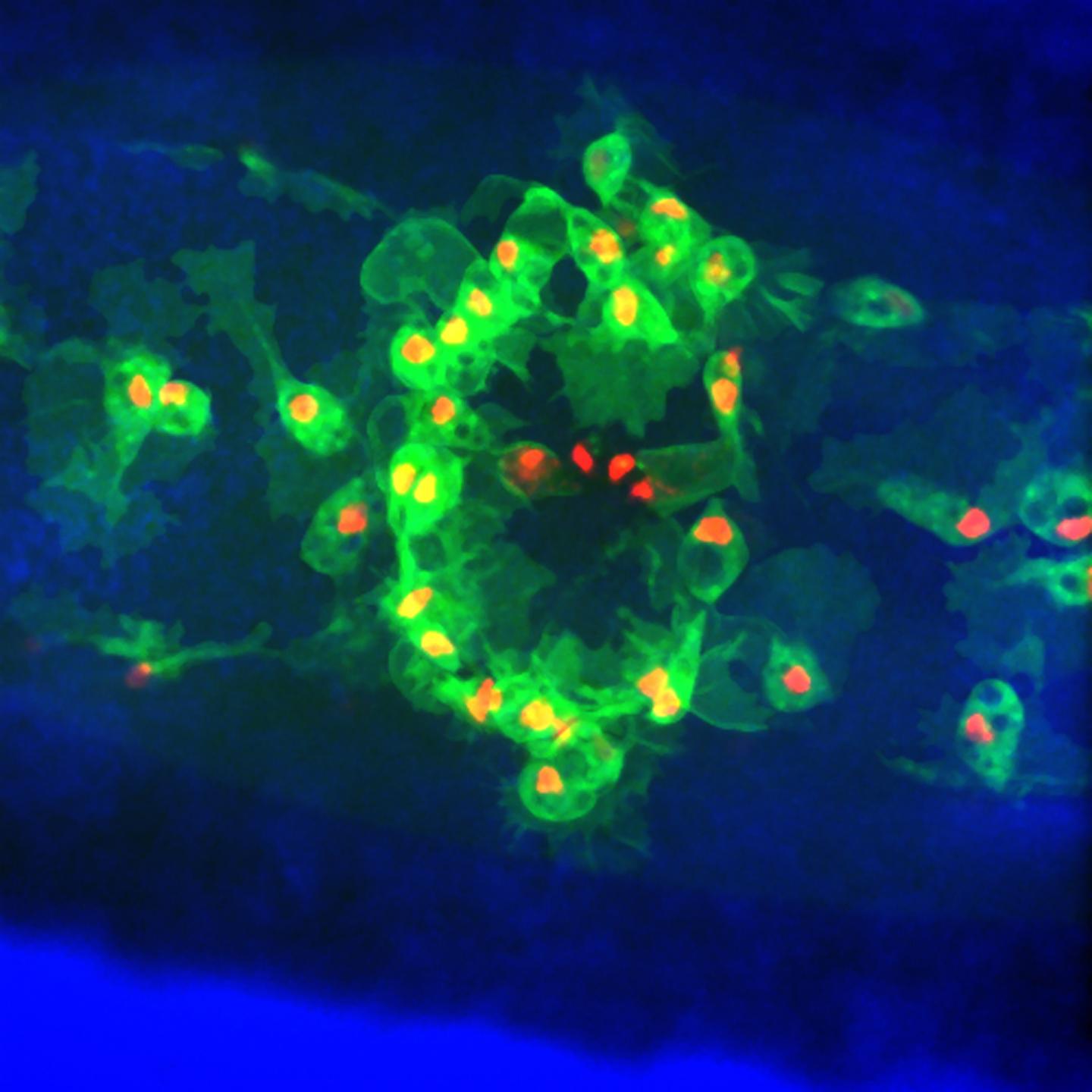
Credit: Dr Iwan Evans, University of Sheffield
- Immune cells prioritise the clearance of dead cells overriding their normal migration to sites of injury
- University of Sheffield research paves the way for new therapies to manipulate how white blood cells get to and are kept at sites of injuries during healing
Dead cells disrupt immune responses and undermine defence against infection, new research has found.
The study, led by scientists at the University of Sheffield, revealed that cells which are programmed to die, a process known as apoptosis, can disrupt the normal function of immune cells, called macrophages. This can impact on how well they respond to wounds and patrol the body to seek out infection.
Our macrophages are needed at wound sites to prevent infection and to aid healing processes, but these white blood cells can also cause and worsen many human diseases, including cancer, heart disease and neurodegenerative disorders.
The findings, published in the journal PLOS Biology, show that immune cells prioritise the clearance of dead cells, which overrides their normal migration to sites of injury, impairing immune responses.
The research, which seeks to understand how immune cells are controlled, could help pave the way for new therapies to manipulate these cells and accelerate healing processes. This study gives scientists new insights into the mechanisms that control immune cells within our bodies, such as how they get to and are kept at sites of injuries.
Dr Iwan Evans, from the Department of Infection, Immunity and Cardiovascular Disease at the University of Sheffield who co-author of the paper, said: “Billions of cells die within our bodies on a daily basis and many of these are removed and digested by our immune cells.
“If this removal process goes wrong it can lead to damaging autoimmune conditions. Excessive or inappropriate immune responses worsen or cause a very broad range of human diseases from cancer to neurodegeneration.
“This work studies fundamental biological processes that are going on inside our bodies everyday that are necessary to keep us healthy.”
The research to investigate the interactions between dying cells and immune cells was conducted using fruit flies which contain macrophage-like cells highly similar to our own immune cells. The new study also uncovered a novel role for a protein called Six-Microns-Under (or Simu) in keeping immune cells at sites of injury. Without this protein the macrophages left wound sites precociously.
Hannah Roddie, fellow co-author of the study and Research Associate at the Department of Infection, Immunity and Cardiovascular Disease at the University of Sheffield, said: “The study shows that the way fruit fly blood cells respond to injuries and dying cells is even more similar to how our own immune cells respond than previously thought.
“We are now looking into what signals macrophages use to track down dying cells and how they choose between the dead cells and wounds. We’re fascinated to understand how immune cells are kept at the sites of injuries.”
###
To view the full paper please visit: https:/
For further information please contact: Amy Huxtable, Media Relations Officer, University of Sheffield, 0114 222 9859, [email protected]
Notes to editors
The University of Sheffield
With almost 29,000 of the brightest students from over 140 countries, learning alongside over 1,200 of the best academics from across the globe, the University of Sheffield is one of the world’s leading universities.
A member of the UK’s prestigious Russell Group of leading research-led institutions, Sheffield offers world-class teaching and research excellence across a wide range of disciplines.
Unified by the power of discovery and understanding, staff and students at the university are committed to finding new ways to transform the world we live in.
Sheffield is the only university to feature in The Sunday Times 100 Best Not-For-Profit Organisations to Work For 2018 and for the last eight years has been ranked in the top five UK universities for Student Satisfaction by Times Higher Education.
Sheffield has six Nobel Prize winners among former staff and students and its alumni go on to hold positions of great responsibility and influence all over the world, making significant contributions in their chosen fields.
Global research partners and clients include Boeing, Rolls-Royce, Unilever, AstraZeneca, Glaxo SmithKline, Siemens and Airbus, as well as many UK and overseas government agencies and charitable foundations.
Media Contact
Amy Huxtable
[email protected]
Related Journal Article
http://dx.




